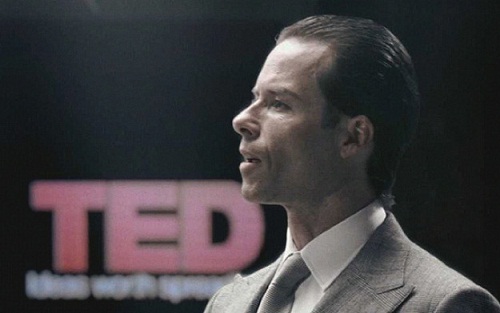Guy Pearce as the enigmatic Peter Weyland. What exactly is he up to?
http://www.youtube.com/watch?v=hUxdAWrsag8
and www.weylandindustries.com
With the Summer blockbuster season fast approaching, the latest piece of Hollywood viral marketing to light up the blogs and social networks of the great webtropolis is this 3-minute video, which acts as a teaser of sorts for Ridley Scott’s hotly-anticipated Alien prequel Prometheus, due out in June. Intriguingly, the clip seems to be aimed squarely at fans of the franchise rather than the casual viewer, as the word “Prometheus” is used only in reference to the mythical Titan, and only those with an intimate knowledge of the Alien universe will understand the significance of the name Weyland. One could question the wisdom of such a tactic, as surely the people at whom the video is targeted are the ones most likely to see the movie anyway. Maybe it’s just an extra treat for the fans, who knows? What is more interesting, however, than this underlying marketing strategy is the content of the video itself, and the implications it has for our understanding and interpretation of the recurring themes of the Alien franchise.
The clip features Guy Pearce in character as Peter Weyland, founder of the company that will presumably become Weyland-Yutani, the sinister corporation ever-present in the background of the other films in the series. Weyland is giving a speech at a future version of the TED conference, taking place in 2023 – sixty-two years before the setting of Prometheus. In front of an enraptured audience, Weyland (in a plummy English accent which some have considered to be an attempted impression of John Hurt) extols the virtue of humanity’s technological development, making a brief mention of the androids which appear in Alien and its sequels. The creation of such life-forms, he claims, signals humanity’s ascent to godhood. This small glimpse of Weyland’s possibly delusional nature unsettles the onscreen audience, and shifts the tone of the clip to a more sinister atmosphere. Weyland then concludes his speech with talk of his unlimited ambition and unstoppable drive to change the world.
Guy Pearce deserves praise here for a magnetic performance as the ever-so-slightly unhinged Weyland, but what he actually says during his mere 3 minutes onscreen is of huge importance, too. This newly-released clip could be seen as just an enjoyable bit of fluff to whet fans’ appetites before Prometheus is released in June, but it’s especially interesting to see how Weyland’s personal Machiavellian ideals were the ethical foundation of his company, and evidently continued to inspire future generations. The Weyland-Yutani corporation’s lust for new technology, for unlimited progress by any means necessary has been evidenced by the underhanded tactics of some of its employees in previous installments in the franchise, as they scrambled to find any way they could to acquire the deadly alien life-form and use it for their own purposes. More importantly, though, the video invites us to consider some eerie simlarities between the behaviour of Weyland and his successors and that of the alien xenomorphs with which his employees would eventually make contact. Both Weyland-Yutani and the aliens pursue their respective goals (technological progress for the humans, continuous reproduction for the aliens) relentlessly, without any heed of moral concerns. The alien xenomorphs, presumably, possess no moral capacity to speak of, while the agents of the company have set theirs aside; either way the end result is the same. Unfettered by moral restraint, the two groups are united in their slavish dedication to processes which have no end in sight, and in the pursuit of which no sacrifice is too great; an amoral obsession which can be traced right back to the mad glint in Peter Weyland’s eye. Humanity was not, as he says, becoming godlike. They were becoming alien.
How much of this subtext is genuinely intended by Ridley Scott and Damon Lindelof is questionable, and it is perhaps fanciful – though tempting – to speculate that Weyland and his ilk are also intended to be a satire on the amoral world of contemporary big business. That said, the alien/corporate comparison is an easy one to make, and once again brings to light a somewhat overused but no less poignant sci-fi trope; it is human beings who are the real monsters.
Jim “This Time It’s Braw” Taylor, student & bookseller

